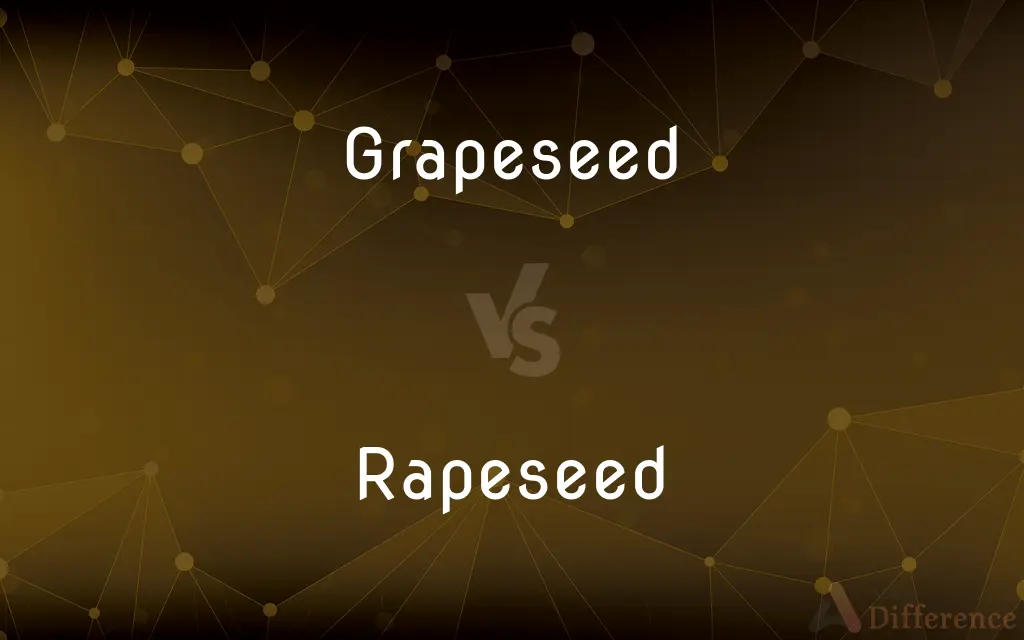Grapeseed vs. Rapeseed — What's the Difference?
By Tayyaba Rehman — Updated on January 14, 2024
Grapeseed oil is extracted from the seeds of grapes, typically a byproduct of winemaking, known for its light flavor and high smoke point. Rapeseed oil, from the seeds of the rapeseed plant, is used in cooking and industrial applications.

Difference Between Grapeseed and Rapeseed
Table of Contents
ADVERTISEMENT
Key Differences
Grapeseed oil is derived from the seeds of grapes, commonly as a byproduct of the wine-making process. It is valued in culinary applications for its relatively neutral flavor and high smoke point, making it suitable for frying and sautéing. Rapeseed oil, extracted from the seeds of the rapeseed plant, is used both in cooking and industrial applications. Its unrefined form has a distinct, strong flavor, but the refined form, canola oil, is milder and more suitable for various cooking methods.
The production of grapeseed oil is less common compared to rapeseed oil, as it requires a large amount of grape seeds, which are small. Rapeseed oil production is more widespread, with rapeseed being grown specifically for oil extraction. Canola oil, a type of rapeseed oil, is specially bred to have lower levels of erucic acid, making it a healthier choice.
Nutritionally, grapeseed oil is high in polyunsaturated fats and contains vitamin E. It's known for its antioxidant properties. Rapeseed oil, particularly canola oil, is low in saturated fat, high in monounsaturated fats, and contains beneficial omega-3 fatty acids, making it a heart-healthy option.
Grapeseed oil is often used in salad dressings, marinades, and cosmetics due to its light texture and moisturizing properties. Rapeseed oil is versatile in cooking and is also used in industrial applications like biodiesel production and as a lubricant.
In terms of availability and price, grapeseed oil is generally more expensive and less commonly found than rapeseed oil due to its lower production volume and the cost-intensive extraction process.
ADVERTISEMENT
Comparison Chart
Source
Grape seeds
Rapeseed plant seeds
Culinary Use
High smoke point, light flavor
Distinct flavor (unrefined), mild (canola oil)
Production Volume
Less common, byproduct of winemaking
Widely produced, specifically for oil
Nutritional Content
High in polyunsaturated fats, vitamin E
Low in saturated fat, high in monounsaturated fats, omega-3s
Price and Availability
More expensive, less common
More affordable, widely available
Compare with Definitions
Grapeseed
Grapeseed oil is extracted from grape seeds.
Grapeseed oil is a byproduct of the wine industry.
Rapeseed
Rapeseed oil is used in cooking and industrial applications.
Rapeseed oil is versatile, used in both food products and biodiesel.
Grapeseed
Grapeseed oil is known for its high smoke point.
I use grapeseed oil for frying due to its high smoke point.
Rapeseed
Rapeseed oil is extracted from the seeds of the rapeseed plant.
Rapeseed oil is a common ingredient in many kitchens.
Grapeseed
Grapeseed oil contains antioxidants and vitamin E.
Grapeseed oil is beneficial for skin due to its antioxidant properties.
Rapeseed
Rapeseed oil is low in saturated fat.
I choose rapeseed oil for its heart-healthy qualities.
Grapeseed
Grapeseed oil is a niche product
Grapeseed oil is often found in gourmet and health food stores.
Rapeseed
Canola oil is a type of refined rapeseed oil.
I use canola oil for its mild flavor and health benefits.
Grapeseed
Grapeseed oil is used in salad dressings and marinades.
Grapeseed oil adds a light, neutral flavor to dressings.
Rapeseed
Rapeseed oil is widely available and affordable.
You can find rapeseed oil in almost any grocery store.
Grapeseed
The seed of the grape.
Rapeseed
Rapeseed (Brassica napus subsp. napus), also known as rape, or oilseed rape, is a bright-yellow flowering member of the family Brassicaceae (mustard or cabbage family), cultivated mainly for its oil-rich seed, which naturally contains appreciable amounts of erucic acid.
Rapeseed
The rape plant or its seed.
Rapeseed
The seed of the rape plant, Brassica napus, used widely for animal feed and vegetable oil.
Rapeseed
The rape plant itself.
Rapeseed
Seed of rape plants; source of an edible oil
Common Curiosities
What is the main use of grapeseed oil?
Grapeseed oil is primarily used in cooking for frying and dressings, and in cosmetics.
Is canola oil the same as rapeseed oil?
Canola oil is a type of refined rapeseed oil with lower erucic acid.
Is grapeseed oil healthier than rapeseed oil?
Both have health benefits; grapeseed is high in polyunsaturated fats, while rapeseed (canola oil) is high in monounsaturated fats and omega-3s.
What are the industrial uses of rapeseed oil?
It's used in biodiesel production and as a lubricant.
Are there any cosmetic uses for rapeseed oil?
While less common than grapeseed, rapeseed oil can also be used in moisturizers and hair products.
What type of fat is predominant in grapeseed oil?
Grapeseed oil is high in polyunsaturated fats.
Is grapeseed oil good for skin care?
Yes, its antioxidant properties and vitamin E content are beneficial for the skin.
How is the smoke point of rapeseed oil compared to grapeseed oil?
Both oils have high smoke points, making them suitable for high-heat cooking.
Can rapeseed oil be used in salad dressings?
Yes, especially canola oil, due to its mild flavor.
Can I use rapeseed oil for frying?
Yes, rapeseed oil is suitable for frying due to its high smoke point.
Why is grapeseed oil more expensive than rapeseed oil?
Grapeseed oil production is less common and more cost-intensive.
Can I substitute grapeseed oil for rapeseed oil in recipes?
Yes, both can be substituted for each other in cooking due to similar properties.
Is grapeseed oil a byproduct of winemaking?
Yes, it's typically extracted from the seeds of grapes used in winemaking.
Does grapeseed oil have a distinct flavor?
Grapeseed oil is known for its light, neutral flavor.
Share Your Discovery

Previous Comparison
Tentacle vs. Tongue
Next Comparison
Shabbos vs. ShabbatAuthor Spotlight
Written by
Tayyaba RehmanTayyaba Rehman is a distinguished writer, currently serving as a primary contributor to askdifference.com. As a researcher in semantics and etymology, Tayyaba's passion for the complexity of languages and their distinctions has found a perfect home on the platform. Tayyaba delves into the intricacies of language, distinguishing between commonly confused words and phrases, thereby providing clarity for readers worldwide.












































